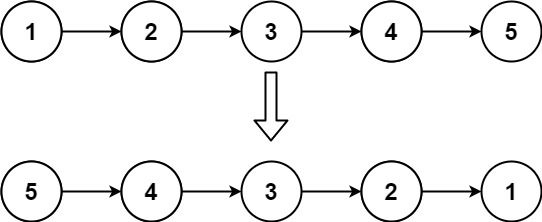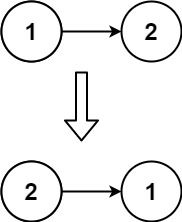Given the head of a singly linked list, reverse the list, and return the reversed list.
Example 1:
Input: head = [1,2,3,4,5] Output: [5,4,3,2,1]
Example 2:
Input: head = [1,2] Output: [2,1]
Example 3:
Input: head = [] Output: []
Constraints:
- The number of nodes in the list is the range
[0, 5000]. -5000 <= Node.val <= 5000
Follow up: A linked list can be reversed either iteratively or recursively. Could you implement both?
# Definition for singly-linked list.
# class ListNode:
# def __init__(self, x):
# self.val = x
# self.next = None
class Solution:
def reverseList(self, head: ListNode) -> ListNode:
pre, p = None, head
while p:
q = p.next
p.next = pre
pre = p
p = q
return preIterative version:
/**
* Definition for singly-linked list.
* public class ListNode {
* int val;
* ListNode next;
* ListNode(int x) { val = x; }
* }
*/
class Solution {
public ListNode reverseList(ListNode head) {
ListNode pre = null, p = head;
while (p != null) {
ListNode q = p.next;
p.next = pre;
pre = p;
p = q;
}
return pre;
}
}Recursive version:
/**
* Definition for singly-linked list.
* public class ListNode {
* int val;
* ListNode next;
* ListNode(int x) { val = x; }
* }
*/
class Solution {
public ListNode reverseList(ListNode head) {
if (head == null || head.next == null) {
return head;
}
ListNode res = reverseList(head.next);
head.next.next = head;
head.next = null;
return res;
}
}/**
* Definition for singly-linked list.
* function ListNode(val) {
* this.val = val;
* this.next = null;
* }
*/
/**
* @param {ListNode} head
* @return {ListNode}
*/
var reverseList = function (head) {
let node = head;
let pre = null;
while (node) {
let cur = node;
node = cur.next;
cur.next = pre;
pre = cur;
}
return pre;
};func reverseList(head *ListNode) *ListNode {
if head == nil ||head.Next == nil {
return head
}
dummyHead := &ListNode{}
cur := head
for cur != nil {
tmp := cur.Next
cur.Next = dummyHead.Next
dummyHead.Next = cur
cur = tmp
}
return dummyHead.Next
}

